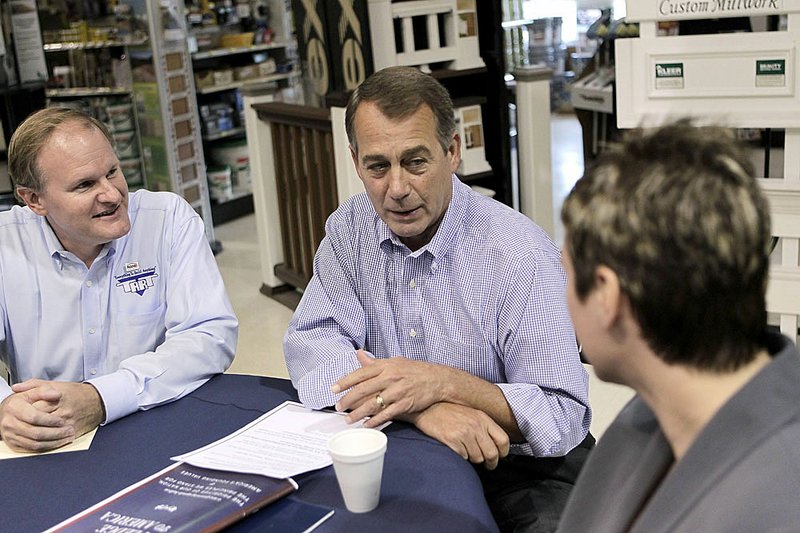WASHINGTON — These are two remarkably different visions for governing America.
Republicans are pledging to shrink the government, cut taxes and undo health-care and stimulus laws. President Barack Obama and Democrats want tax cuts for the middle class, more stimulus spending and an end to the outsourcing of U.S. jobs.
With Thursday’s release of the GOP’s Pledge to America - a manifesto promising to return government to the people, trim it through deep spending cuts, and refocus it on defense and tax cuts - the two parties have laid out contrasting agendas for the next two years.
Less than six weeks before midterm congressional elections, it’s promise-making time for both parties, and voters are getting some insight into how the two parties want to change the country.
The starkest differences are on spending and taxes. Republicans want to extend all of George W. Bush’s income tax cuts permanently, reducing government revenue by some $4 trillion over 10 years, and add new ones including a 20 percent deduction for small businesses.
Democrats are proposing to extend those cuts for individuals making up to $200,000 and for families earning up to $250,000 but to hit wealthier individuals and some small businesses with tax increases in January. Their plan would reduce government revenue by $3 trillion. They’re also proposing to give investment tax breaks to small businesses. In addition, Democrats want to impose tax penalties on companies that move jobs and factories overseas and to offer tax breaks for firms that bring jobs back to the United States.
On spending, Republicans say they want to roll the government back to 2008 levels, although they would leave intact three constituencies: veterans, senior citizens and the military. They say they’d freeze stimulus projects and impose hard limits on future spending, although they did not proposea ban on earmarks, the practice of individual lawmakers steering projects to their districts.
It’s unclear how much could be saved through these measures. Most of the $814 billion in stimulus money has already been spent. The GOP estimates its cuts would amount to $100 billion in savings a year, but budget experts say the figure could be far less.
Exempting veterans, senior citizens and defense spending “leaves a pretty small slice of pie to be whittling away at, and hard to believe there is $100 billion in savings available as promised,” Steve Ellis of the group Taxpayers for Common Sense wrote in an e-mail. “Political promises come and go, we will have to see if this product has any traction or is even remotely implementable.”
Democrats, for their part, are calling for more spending to jump-start the ailing economy. Obama has proposed a $50 billion road-, railway- andrunway-building plan as well as a new infrastructure bank to pay for future projects.
The two parties are at odds on health care.
Republicans would repeal this year’s big overhaul, presumably canceling parts that began taking effect Thursday: letting young adults remain onfamily health plans until they turn 26, providing free preventive care and ending denials of coverage to children with preexisting conditions.
The GOP proposes to replace the measure with an array of changes to make it easier for individuals to find private insurance and pay for medical care. Those include letting people buy coverage outside their states, expanding state programs that cover high-risk patients who can’t otherwise get insurance and expanding the use of tax-advantaged savings accounts to cover medical costs.
Like Democrats, Republicans say they would put an end to lifetime and annual coverage limits and bar insurers from canceling coverage for people who get sick. But the GOP stops short of making it illegal to deny insurance to anyone with a pre-existing condition. The Pledge to America says that would be so only for people who already had coverage.
There are plenty of question marks in both parties’ agendas. Neither has been specific about how it would accomplish the trickiest items.
The Republicans pledge to “put government on a path to a balanced budget and pay down the debt.” But when itcomes to addressing looming shortfalls in Social Security and Medicare, two drivers of deficit spending, the GOP is silent on how to do it.
House Republican leader John Boehner of Ohio, who would be speaker if the GOP won the 40 seats it needs to take control, said he’d be open to suggestions from the public about that issue.
“It’s time for us as Americans to have an adult conversation with each other about the serious challenges that face our country. I don’t have all of the solutions,” he said.
Similarly, Democrats have hit Republicans hard on the campaign trail for what they say is the party’s plan to privatize Social Security, but they haven’t said what they’d do to fix the program’s financial programs, either.
Democrats are working to persuade voters that they’ve done the best possible with a GOP-created mess.
Republicans are working to strike a tricky balance. Some of them privately questioned the decision to unveil a major policy agenda at all, arguing that it could trip up their candidates and spoil an anti-Obama strain among voters that was working to their advantage.
Front Section, Pages 4 on 09/24/2010

